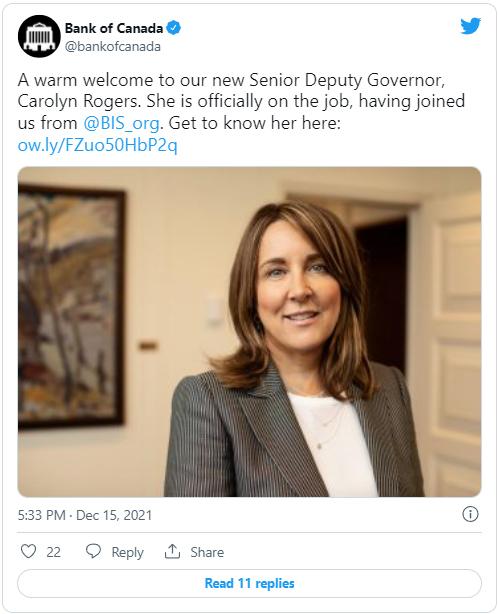
Governance
The Bank of Canada Act provides the legal authority and framework for governance of the Bank of Canada.
Several important governance changes occurred in 2021:
- Carolyn Rogers was appointed Senior Deputy Governor of the Bank for a seven-year term, effective December 15. As Senior Deputy Governor, Ms. Rogers is a member of the Bank’s Executive Council, Governing Council and Board of Directors.
- Sharon Kozicki was appointed Deputy Governor and member of the Bank’s Executive Council and Governing Council, effective August 2.
- Ron Morrow was appointed Executive Director, Retail Payments Supervision, effective August 9. This executive-level position was created to support the Bank’s new mandate to supervise retail payment service providers under the Retail Payment Activities Act. As Executive Director, Mr. Morrow is also a member of the Bank’s Executive Council.
Most governance activities—including meetings of the Board of Directors, Executive Council and supporting subcommittees—were conducted virtually throughout 2021 because of the COVID‑19 pandemic.
A warm welcome to our new Senior Deputy Governor, Carolyn Rogers. She is officially on the job, having joined us from @BIS_org. Get to know her here: http://ow.ly/FZuo50HbP2q December 15, 2021

https://twitter.com/bankofcanada/status/1471246962401886214
Board of Directors
The Bank’s Board of Directors is composed of:
- the Governor
- the Senior Deputy Governor
- 12 independent directors
- the Deputy Minister of Finance (who is an ex officio non-voting member)
Pursuant to the Bank of Canada Act, the Governor is both:
- Chief Executive Officer of the Bank
- Chair of its Board of Directors
As Chair, the Governor leads the Board’s oversight of corporate, financial and administrative matters. Monetary policy is neither formulated nor implemented by the Board. However, directors regularly provide insight on prevailing economic conditions in their respective regions and sectors.
All independent (non-management) directors are appointed for three-year renewable terms by the Minister of Finance with the approval of the Governor in Council. The independent directors elect a lead director for a two-year renewable term. The lead director provides leadership to improve the Board’s effectiveness and acts as a key point of contact with the Governor.1 Claire M. C. Kennedy was reconfirmed as lead director in 2020 and continued in this role throughout 2021.
The Bank of Canada Act and the Conflict of Interest Act specify eligibility requirements for members of the Board and outline rules to prevent conflicts of interest.
The Board also requires its independent directors to follow the Code of Business Conduct and Ethics for Directors.
As a result of resignations in 2021, the Bank has two vacant positions on its Board of Directors. The Minister of Finance, with the Governor in Council’s approval, is expected to fill these vacancies in 2022.
See the 2021 Board of Directors
Committee structure and meetings
The Board of Directors has five standing committees, each of which has terms of reference and an annual work plan to guide its activities. The Bank of Canada Act also provides for an Executive Committee, while being accountable to the Board, to act in place of the Board. Each standing committee of the Board, except the Pension Committee, consists solely of independent directors.
Bank of Canada management
Governor and Senior Deputy Governor
The independent members of the Board of Directors appoint the Governor and Senior Deputy Governor for seven-year terms, with the approval of the Governor in Council. The length of this term allows the Governor and Senior Deputy Governor to adopt a longer-term perspective. This is essential to the Bank’s effectiveness in:
- conducting monetary policy
- performing its other core functions
The salaries of the Governor and Senior Deputy Governor are determined by the Board within ranges established by the Government of Canada’s Advisory Committee on Senior Level Retention and Compensation. They are subject to approval by the Governor in Council.
Governing Council
Pursuant to the Bank of Canada Act, the Governor:
- has specific authority and responsibility for the business of the Bank
- oversees the Bank’s core functions with assistance from the Senior Deputy Governor and the Deputy Governors
The Governor, the Senior Deputy Governor and Deputy Governors constitute the Bank’s Governing Council.
Two internal committees are in place to provide advice:
- The Monetary Policy Review Committee assesses economic conditions in Canada and provides advice to Governing Council on monetary policy.
- The Financial System Review Committee is the main forum for presenting and discussing issues related to the financial system.
Bank of Canada management structure
Executive Council—composed of Governing Council, the Chief Operating Officer (COO) and the Executive Director, Retail Payments Supervision—is responsible for assisting the Governor in oversight of the Bank’s strategic direction.

Executive Council, from left: Executive Director, Retail Payments Supervision Ron Morrow, Deputy Governor Timothy Lane, Deputy Governor Sharon Kozicki, Deputy Governor Paul Beaudry, Governor Tiff Macklem, Senior Deputy Governor Carolyn Rogers, Deputy Governor Lawrence Schembri, Chief Operating Officer Filipe Dinis and Deputy Governor Toni Gravelle.
As members of Executive Council:
- the COO oversees strategic and operational planning, administration and operations
- the Executive Director, Retail Payments Supervision, oversees the Bank’s new mandate to supervise retail payment service providers under the Retail Payment Activities Act
The Leadership Forum—composed of Executive Council, advisors and the managing directors of each department—focuses on:
- strategic Bank issues
- nurturing a leadership culture
The Senior Management Council is composed of both standing and rotating committee members from the Bank’s Leadership Forum. It supports the work of Executive Council by overseeing:
- operational issues
- corporate programs
- strategic initiatives
- financial reporting
- annual planning
- related risks
Compliance and ethics
The Bank requires that all employees observe the highest standards of professional ethics. To this end, the Bank’s comprehensive Code of Business Conduct and Ethics is in place to address the personal and professional conduct of Bank employees. The policy on disclosure of wrongdoing provides information to employees on how to report wrongdoing and outlines management’s role in disclosures, investigations and reporting.
The Code of Business Conduct and Ethics is reviewed annually by the Board.
More information
Code of Business Conduct and Ethics
- 1. See Bank of Canada, “Lead Director: Terms of Reference” (December 2020) for more information.[←]